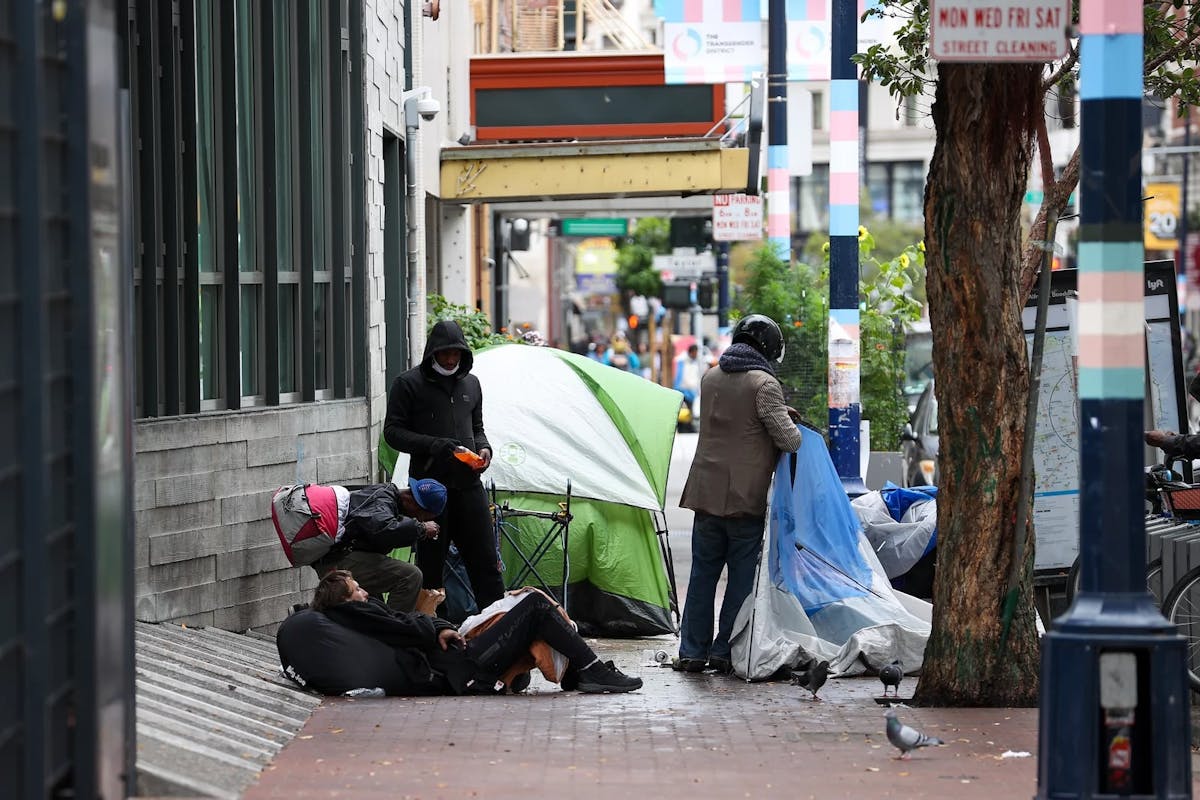As San Francisco Reels From Record Overdoses, Democratic Mayor Pushes Ballot Measure To Screen Welfare Participants for Drugs
‘This is a political message,’ one observer tells the Sun: ‘San Francisco is no longer open for business as the drug mecca for Northern California.’

As crime, homelessness, and rampant addiction grips the streets of San Francisco, voters will decide on March 5 on a contentious ballot proposal that would screen welfare recipients for drug addiction and compel treatment for drug users who wish to receive benefits.
San Francisco is reeling from its deadliest year on record for drug overdoses, fueled by enormous amounts of fentanyl on the streets. “Proposition F” is sponsored by the city’s Democratic mayor, London Breed, who is running for re-election and facing criticism from the crime-weary city residents.
It’s not Ms. Breed’s only tougher-on-drugs approach heading into the election — she also, in a change of tune, is supporting a Republican effort to overhaul Proposition 47, a 2014 voter-enacted referendum that reduced penalties for shoplifting, theft, and illegal drug use.
Proponents of San Francisco’s drug-screening ballot measure say it would motivate individuals struggling with addiction to get treatment rather than enable drug purchases. Opponents claim it would lead to more homelessness and target vulnerable populations.
The proposal is a “political message” to the rest of the state “that San Francisco is no longer open for business as the drug mecca for Northern California,” a recovery advocate and former intravenous drug user who lived on the streets of San Francisco, Tom Wolf, tells the Sun.
It would eventually “create a deterrent to make people think twice” about coming to San Francisco to access robust services while they’re homeless or experiencing addiction, he says. It would “put up a ‘no vacancy’ sign, saying that San Francisco is no longer the place for you to come to get drugs and to be homeless on the street, where nobody will bother you, and get a ton of benefits.”
While he was living on the streets, Mr. Wolf says he regularly saw people who received assistance from the city cash out the benefits to buy drugs.
“We knew that on the 30th or 31st — the last day of the month — at 10 p.m., your money would hit your EBT card,” he says. “And so at 10:01, everybody would walk over to the ATMs and start withdrawing money and start purchasing drugs.”
The first few days of the month after benefits hit, “overdoses seem to spike” because money is flowing and people can use more drugs and buy stronger variations of fentanyl, Mr. Wolf says. Because addiction is progressive and users tend to want increasingly strong doses of the drug, addicts are vulnerable to dealers pushing strong doses of fentanyl, increasing the likelihood of overdoses.
“Go down to the Tenderloin neighborhood, on the first of the month,” he says. “And you’ll see like three times as many drug dealers out there, because they know that it’s check day.”
Towards the middle and end of the month, as the welfare benefits run out, “you see people kind of falling more into desperation, as a result of them running out of money,” Mr. Wolf says.
San Francisco’s Proposition F would require recipients of the County Adult Assistance Program “who are reasonably believed to be dependent on illegal drugs to be screened for substance abuse and to participate in appropriate substance abuse treatment where recommended by a professional evaluator.” Those who don’t comply would lose benefits, but the measure provides temporary housing stipends and shelter services for those whose aid would be cut off.
“The current drug epidemic is unlike anything this city has seen before,” the measure reads. “The severity of this crisis calls for more tools to incentivize people into treatment, rather than blindly following the status quo.”
The city’s homeless population is as many as 20,000 people on a given night and it has one of the highest per-capita overdose rates in the country.
“If San Francisco wants to recover from the doom loop that they are calling right now — our empty downtown, our office vacancy rates, the homeless crisis, the unmitigated retail theft that’s happening, and of course, the overdoses — you need to build some accountability back into the process,” Mr. Wolf says, as the political tide starts to turn in the city.
“There’s really no Republicans in San Francisco. It’s progressive Democrats versus moderate Democrats,” he says. “Our Democratic Central Committee has been leaning towards actual socialism,” he says, but “it looks like it’s going to swing back towards the center.”
Opponents of the proposal, including San Francisco’s public defender, Mano Raju, say it’s “a flawed measure that will cut vital assistance to the most vulnerable people in our communities.”
“This will lead to people losing their housing, or if they are unhoused, losing their shelter bed. Prop F could lead to thousands of people who receive housing/shelter and assistance ending up on the streets,” he wrote on X, adding that it would “result in increased homelessness, create new expensive bureaucracy, and will actually make it harder for people who want treatment to get it.”

